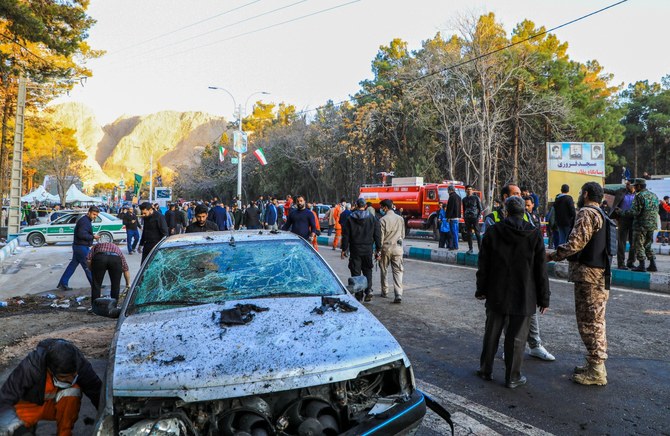Talmiz Ahmad
Two explosions last week surged through crowds at the mausoleum of former Quds Force commander Gen. Qassem Soleimani in Kerman. Thousands of people were there to mourn their great national hero, who had been killed by American missiles in Baghdad four years earlier. The first bomb was ignited just 700 meters from the shrine; the second exploded 15 minutes later about a kilometer away, killing many of those who had fled from the earlier attack.
Nearly 90 people were killed, making this the most lethal attack in Iran since the truck bombing of the Islamic Republican Party’s headquarters in Tehran in 1981, in which 74 people were killed.
As the nation reeled from these double blows, Supreme Leader Ali Khamenei blamed the country’s “malicious and criminal enemies,” without identifying anyone specifically. But other officials were quick to point fingers at the US and Israel. This was a particularly charged accusation since, a day earlier, Israeli missiles had killed senior Hamas leader Saleh Al-Arouri in Beirut. He had been Hamas’ principal link with Hezbollah and Iran. A week before that attack, Israel had killed Sayyed Razi Mousavi, a senior Quds Force official, in Damascus.
Tensions were defused when Daesh subsequently claimed responsibility for the horrendous Kerman attack. Its statement identified two suicide bombers who had detonated their vests amid the gathering of “polytheists” at the grave of the “hypocrite” commander. Since then, 12 people have been arrested in six different provinces. Officials have identified one bomber as a Tajik, but no other details have become public so far. There were earlier attacks in Iran attributed to Daesh, but none that caused casualties on this scale.
The popular mood in Iran is one of rage at the failure of the state authorities to provide security to their people, particularly when they otherwise harshly handle all expressions of internal dissent. News reports are awash with people angry at Iran’s failure to respond effectively to several earlier attacks from the US, Israel and Daesh. Officials’ tough rhetoric has been condemned as “empty and fake,” while there have been calls for an end to the policy of “strategic restraint.” Observers have warned that Daesh has been emboldened largely because there had been no response to earlier American and Israeli attacks. One senior official even called on Iran to launch a joint attack with its allies to deter future assaults by Israel.
Though there are Daesh stragglers in Syria and Iraq, the Kerman bombing is believed to be the handiwork of the entity in Afghanistan, which is referred to as Daesh Khorasan. It remains deeply hostile to the Taliban administration in Kabul and has targeted it on several occasions. As Iran has now moved fresh troops to the Afghanistan and Pakistan borders, it is likely that it will target the group’s positions, most probably in the Afghan province of Herat. However, given the mountainous terrain, the extent of the damage is likely to be minimal. While Iran will have to contend with the threat from Daesh Khorasan, it will remain a sideshow compared to the challenges emerging from the Gaza war. Iran is at the heart of the ongoing conflict: It is close to Hamas and is the powerful sponsor of militias in Syria, Hezbollah in Lebanon, the Popular Mobilization Units in Iraq and the Houthis in Yemen. They constitute the regional “axis of resistance” and are together engaged in a war of attrition, hitting Israeli and US targets.
Since early October, Hezbollah has been regularly targeting Israeli assets and has tied down several military units at Israel’s northern border, while diverse militias from the PMU have launched more than 100 attacks on US targets in Iraq. Both have invited Israeli and US retaliation, including targeted killings. Houthi attacks on Red Sea shipping have proven most effective as, since November, they have threatened global maritime flows. They have been demanding increased humanitarian aid for the beleaguered Palestinians in Gaza. The Israeli mass killings in Gaza, with no strategic objective or endgame in mind, have aggravated regional security concerns and brought the long-standing Iran-Israel “shadow war” to the center of the regional scenario. The principal concern now is that Israeli Prime Minister Benjamin Netanyahu may opt for a regionwide conflict. Following the rejection of his judicial reforms by the Supreme Court, he is facing popular calls for his resignation, arrest and incarceration. Hence, he may judge this to be a good opportunity to exterminate both Palestinian resistance and Hezbollah and turn Israel’s guns on Iran.
With Iran hit hard by the Kerman tragedy and with a long record of Israeli violence that remains unavenged, its leaders may find themselves no longer able to sustain their commitment to “strategic patience.” This dangerous situation calls for the US to abandon its pusillanimous approach and insist on an immediate ceasefire, to be followed by a dialogue on Palestinian aspirations. Otherwise, the tragedy of Kerman could plunge the Middle East into a regional conflagration.
Arab News







